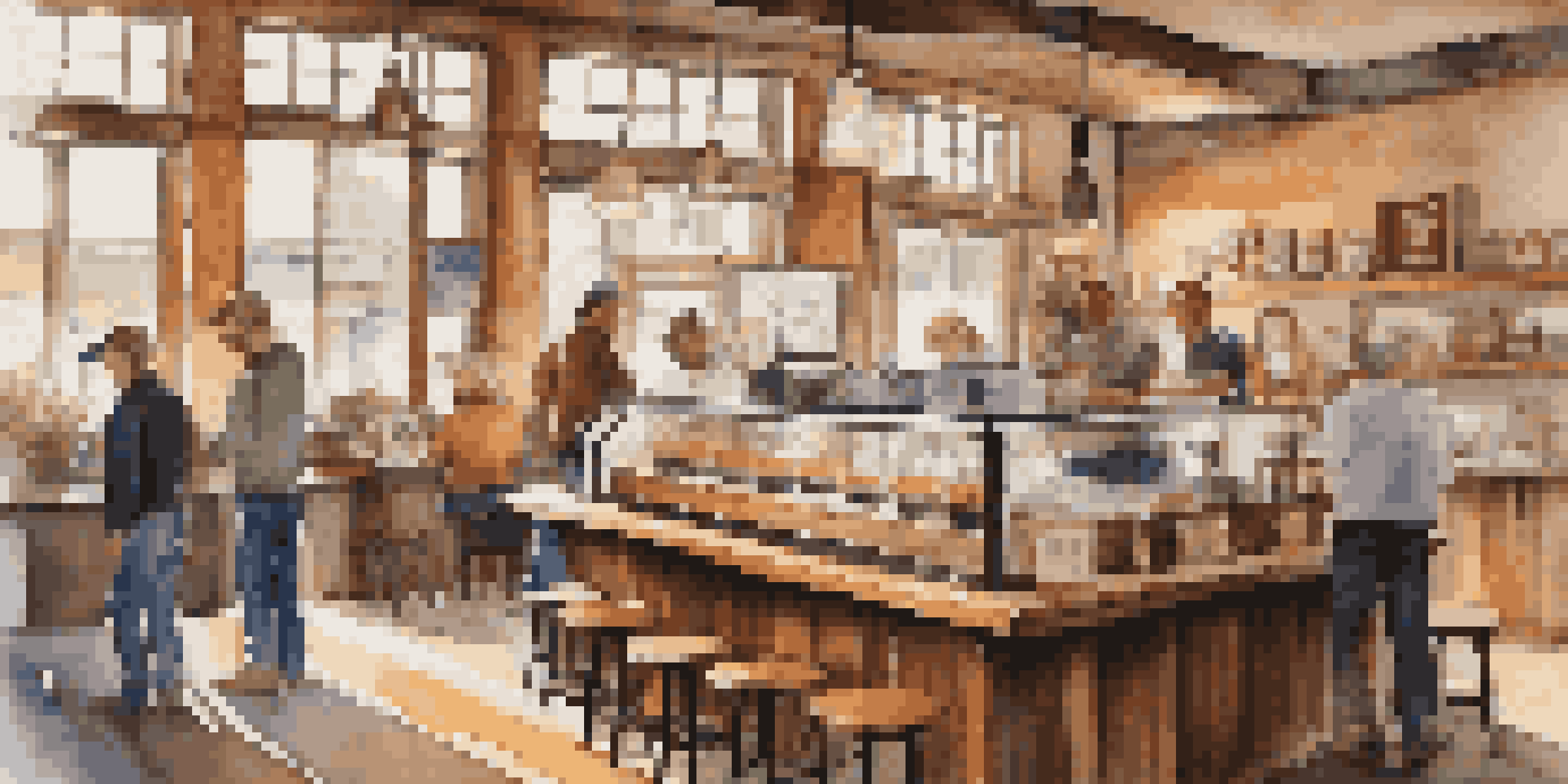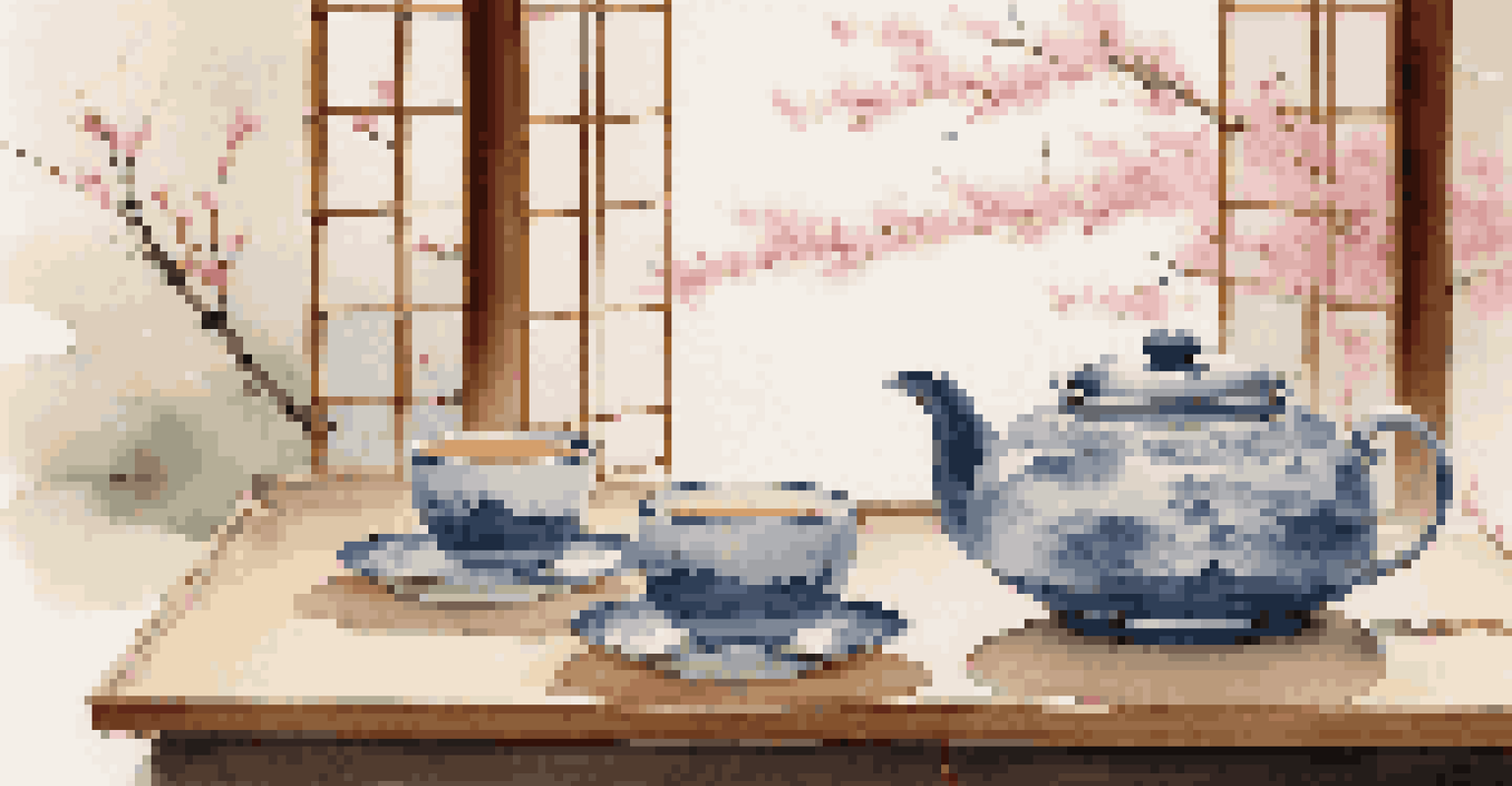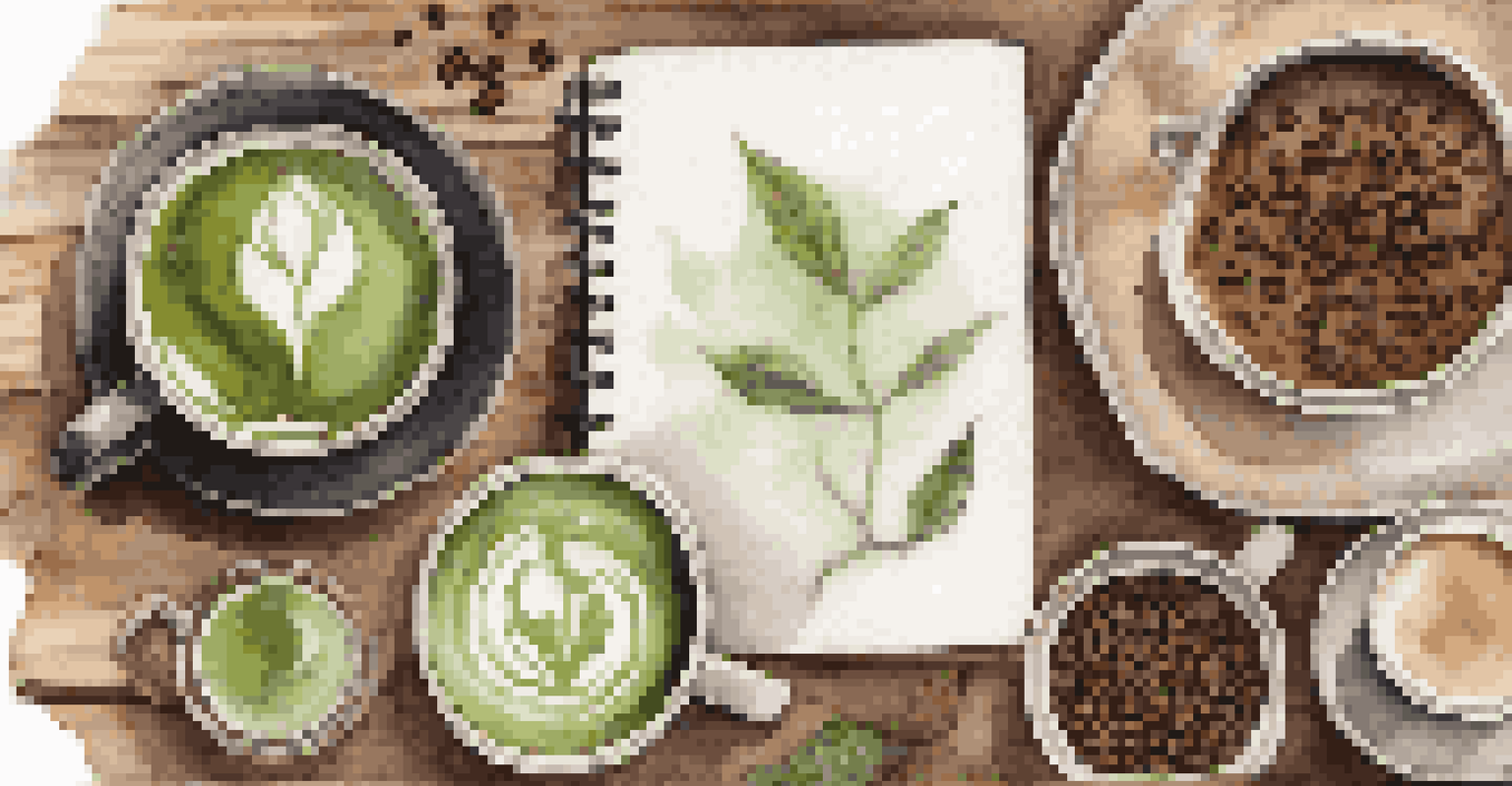Coffee and Tea in Pop Culture: Representation and Trends

The Role of Coffee in Movies and TV Shows
Coffee has become a central character in numerous films and television series, often representing comfort, community, or even chaos. Think of iconic scenes, like the coffee shop chats in 'Friends' or the intense moments in 'Pulp Fiction' where coffee fuels the dialogue. These scenes not only highlight coffee's cultural significance but also how it acts as a social lubricant, bringing characters together.
Coffee is a language in itself.
In many narratives, coffee stands as a symbol of maturity and sophistication. For instance, in 'Gilmore Girls,' the fast-paced coffee consumption reflects the characters' vibrant lifestyles and witty banter. This portrayal encourages viewers to associate coffee with energy, connection, and, quite often, nostalgia.
Moreover, coffee culture in pop media often mirrors real-life trends, such as the rise of artisanal coffee shops. As these trends gain popularity, they influence viewer preferences, leading to an increase in local coffee shop visits, thereby creating a cyclical relationship between media representation and consumer behavior.
Tea's Gentle Presence in Literature
Tea often brings a different vibe to pop culture, usually embodying calmness and reflection. Classic literature, like 'Alice's Adventures in Wonderland,' features tea parties that symbolize whimsy and the delightful absurdity of life. This portrayal invites readers to see tea as a bridge to a more imaginative world.

Contemporary novels also embrace tea as a tool for character development. In many stories, authors use tea-drinking moments to convey intimacy or vulnerability among characters, as seen in 'The Tea Girl of Hummingbird Lane.' These moments often lead to deeper conversations, emphasizing tea's role in building relationships.
Coffee as a Cultural Connector
Coffee serves as a social lubricant in media, fostering connections and reflecting cultural significance across various narratives.
Additionally, as wellness trends rise, tea is often portrayed as a healthier alternative to coffee in pop culture. This shift is reflected in social media trends, where influencers share calming tea rituals, promoting mindfulness and self-care, thus enhancing tea's reputation as more than just a beverage.
Cultural Differences in Coffee and Tea Consumption
Both coffee and tea are enjoyed worldwide, yet their cultural significance varies greatly. In Italy, espresso is a way of life, often consumed quickly at bars, while in Japan, tea ceremonies reflect deep cultural traditions and respect. These differences highlight how each beverage carries its own narrative and significance within various societies.
Tea is the magic key to the vault where my brain is kept.
In the U.S., coffee shops have become social hubs, while in countries like China, tea serves as a symbol of hospitality and tradition. These cultural nuances shape how individuals experience and relate to each beverage, influencing global trends and consumption patterns.
Understanding these differences enriches our appreciation for coffee and tea, encouraging us to explore various customs and rituals. As globalization continues, these cultural exchanges allow for an evolving dialogue surrounding coffee and tea, making them not just drinks but vessels of cultural identity.
The Rise of Specialty Coffee and Tea Trends
In recent years, there's been a noticeable shift towards specialty coffee and tea, emphasizing quality over quantity. Artisanal coffee shops focus on sourcing beans from specific regions, while tea enthusiasts seek high-grade loose-leaf teas. This trend reflects a growing consumer desire for authenticity and a connection to the origins of their beverages.
Social media plays a pivotal role in showcasing these specialty trends, with platforms like Instagram filled with vibrant coffee art and aesthetically pleasing tea setups. This visual representation not only elevates the perception of these beverages but also inspires individuals to experiment with their own brewing techniques.
Tea as a Symbol of Calmness
Tea often embodies tranquility and reflection in literature, enhancing character development and promoting wellness trends.
As these trends gain traction, they promote a culture of mindfulness and appreciation. Coffee and tea drinkers are increasingly engaging in conversations about flavor profiles and brewing methods, creating a community that values quality experiences over mere consumption.
Coffee and Tea in Music and Lyrics
Music has long been intertwined with coffee and tea, often using these beverages as metaphors for emotions and experiences. Songs like 'Black Coffee' by Ella Fitzgerald illustrate the heartache associated with love, while 'Tea and Sympathy' by Jars of Clay highlights the soothing qualities of tea in times of distress. These references resonate with listeners, making the beverages relatable and emotionally charged.
Artists often use these drinks to evoke specific moods or settings in their lyrics. For instance, coffee often represents a bustling city life or a moment of reflection, while tea might signify comfort and tranquility. This duality allows listeners to connect with the songs on a personal level, enriching their overall experience.
As more artists embrace themes of wellness and mindfulness, we may see a further rise in references to tea rituals and coffee culture. This ongoing evolution demonstrates the power of beverages to encapsulate complex human emotions and experiences through art.
Coffee and Tea in Fashion and Lifestyle
The aesthetics of coffee and tea have become a significant aspect of fashion and lifestyle branding. From trendy coffee mugs to tea-infused skincare products, these beverages are now part of a broader lifestyle identity. This trend reflects a desire for holistic living, where wellness and style intersect seamlessly.
Fashion brands often collaborate with coffee and tea companies to create unique products, like tea-scented perfumes or coffee-themed apparel. This synergy allows consumers to express their love for these beverages in more ways than one, reinforcing their cultural relevance.
Evolving Beverage Trends
The rise of specialty coffee and tea trends highlights a consumer preference for quality and authenticity, influencing lifestyle choices.
As the lifestyle market continues to evolve, coffee and tea are positioned not just as consumables but as integral elements of personal branding. This shift encourages individuals to curate their lives around their beverage choices, fostering a sense of community among enthusiasts.
The Future of Coffee and Tea in Pop Culture
Looking ahead, the representation of coffee and tea in pop culture appears poised for exciting developments. With the growing awareness of sustainability and ethical sourcing, there’s a potential shift in narratives that focus on the origins and environmental impact of these beverages. This could lead to a more informed consumer base that values transparency and responsibility.
Moreover, as the wellness movement continues to gain momentum, we may see even more emphasis on the health benefits of both coffee and tea in media representations. Expect to see characters discussing the virtues of matcha or cold brew in a positive light, reinforcing their roles as essential components of a balanced lifestyle.

Ultimately, coffee and tea will continue to evolve alongside cultural trends, reflecting societal values and preferences. Their representation in pop culture will likely adapt, ensuring these beloved beverages remain relevant and cherished in our daily lives.